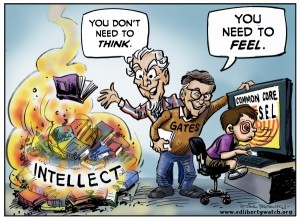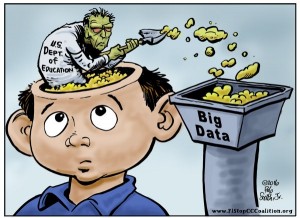The National Pulse – 6 Big Problems with Latest “Social Emotional Learning” Report
This National Pulse article written by Dr. Karen Effrem outlines what makes the Aspen Institute’s National Commission on Social, Emotional, and Academic Development’s new report on the use of social emotional learning in public education problematic. More specifically, how the report failed to complete fundamental and controversial issues with the teaching method such as invasion of privacy, federal overreach, etc…
1.) The Commission promotes the care and development of the “whole child” as an individual while simultaneously pushing standardized SEL teaching and assessment via “state standards, guidance, and frameworks” and the trend toward machine based skills training (including SEL training and assessment) via competency-based and personalized learning.
This is an oxymoron. If there are at least nine different names for SEL and schools are supposed to help children grow into their best individual selves, than how can there be SEL standards at all? The answer lies in the career focus of SEL.
2.) The Commission wants to expand SEL research, despite the lack of scientific and policy consensus on a definition of SEL and the existence of many SEL studies that have flaws and mixed or negative results.
We have discussed this aspect a number of times (see here and here for example). Even proponents and SEL experts admit there are problems with the research. This includes research on the academic achievement, brain science, and genetics aspects of SEL to name a few. In many ways, it is like the research on preschool described above or that of psychiatric drugs. There are grand claims initially for these programs or products, but with time and further scrutiny, the claims fall apart like wet tissue paper.
3.) The final report only contains two token mentions of privacy, which is gravely endangered by the SEL and the ed-tech phenomena.
The rate and extent of social emotional data collection — via federal assessments like the NAEP and federally mandated state assessments, education technology companies like Knewton and Dream Box that are collecting millions of data points per student per day, and foreign entities like OECD and China — is becoming difficult to follow. That is why the gutting of the federal privacy law, FERPA, during the Obama administration and the recent passage of FEPA that will create a de facto national database is all the more maddening.
4.) The Commission believes that there will be no federal control or interference for states and districts implementing SEL — even while one of their interim reports lists scores of federal programs supporting those concepts.
No kidding. After the Commission policy brief lists 111 different federal programs in 8 different federal agencies, plus the Corporation for National and Public Service that can be “leveraged” to achieve their SEL nirvana, Commission co-chairman Tim Shriver and putative conservative Rick Hess of the American Enterprise Institute solemnly intone that the report “should not be mistaken for an invitation to federal policymakers” to get involved in SEL.
5.) The Commission believes that somehow teachers can and will want to “develop expertise in child development and in the science of learning” with all of their other burdens, when there is no clear consensus on the science of SEL and in the midst of national teacher shortage.
Wonderful, experienced teachers are leaving the profession in droves because they are forced to teach the academically inferior, developmentally inappropriate, and psychologically manipulative Common Core while they are monitored on everything they teach via poorly validated tests that affect their pay and tenure via incomprehensible algorithms, have their desired curriculum removed from their classrooms, and are required to act as amateur psychologists in order to prevent school shootings and suicide.
6.) The Commission expects that SEL programs and curriculum will fill the cavernous social emotional void for the millions of children growing up in fatherless homes.
The statistics are overwhelming that children — especially boys — from fatherless homes have more SEL problems. Examples include:
Significantly higher juvenile crime rates
A 279 percent increased likelihood of carrying a gun
Externalizing behavior problems as early as one year of age
The full article can be found here on The National Pulse’s website.
The National Pulse – Flawed Report Uses Pseudoscience to Promote “Social Emotional Learning”
This article written by Dr. Karen Effrem for The National Pulse, discusses a recent report put out by the National Commission on Social Emotional and Academic Learning and its problems.
Focus on Victimhood and Identity Politics
There is much discussion in the paper about issues such as “stereotype threat” and how “if one’s cultural beliefs and values feel at odds with those of the dominant cultural group, the conflict can cause misalignment between a person’s goals and ways of being and the expectations of the setting.” To fix this perceived cultural oppression in the schools, they want government “interventions and supports in the home, school, or community that specifically target cultural well-being [to] improve educational, socioeconomic, and health outcomes.” This social justice focus is not at all surprising given that one of the paper’s authors is Linda Darling Hammond, co-chair of this commission as well as co-chair of the Collaborative for Academic Social Emotional Learning (CASEL) and radical terrorist Bill Ayers’ choice to be Secretary of Education under President Obama.
No Attention to Breakdown of the Family
The government subsidy of fatherless families has been happening since the 1960s, and the sociological problems with that approach have been documented since the 1970s beginning with Democrat Daniel Patrick Moynihan. The myriad of studies and articles documenting the downsides of growing up in a single-parent household and collated at wonderful websites like Marripedia is completely ignored in this paper. These downsides include increased social emotional distress and mental illness, school problems and failure, acting out, juvenile delinquency, teen pregnancy and drug use. Any paper that makes recommendations about the social emotional, cultural and family status of children without discussing the research around this issue and making recommendations for reversing this destructive policy doesn’t merit much consideration.
Conflicts of Interest
The list of funders for this commission contains all of the usual suspects — including the Gates Foundation. Three of the funders for this commission are foundations tied to corporations that have profited or will profit handsomely from the expansion of SEL curriculum, monitoring software (Microsoft/Gates) and hardware (Hewlett Packard/Hewlett), or from psychiatric medication when a child is falsely labeled abnormal by these subjective standards and mental screening tools and referred to a mental health professional (Johnson & Johnson/Robert Wood Johnson [RWJ]).
The full article can be found on The National Pulse’s website here.
Dr. Effrem’s National Pulse archive is available here.
The National Pulse – Students’ Privacy Under Serious Threat in Era of School Shootings
This article discusses two federal School Safety Commission meetings dealing with school safety as well as efforts in Florida since the February shooting in Parkland, Florida and how these efforts can and will damage data privacy:
Only one of the three witnesses at the July 11th hearing thought that inappropriate data sharing would hinder students from seeking mental health help. No one discussed the many other dangers of having behavioral and mental health data, especially subjective and often inaccurate screening data collected by minimally trained school personnel reside in longitudinal databases for life. These will be further discussed in a moment.
Another disturbing and related set of developments are the multiple ways that data privacy is being violated in the newly enacted Florida school safety law. These include requiring students to admit any mental health diagnoses, accurate or not, on their beginning-of-year school forms and the new law’s requirement to develop a “centralized integrated data repository and data analytics resource.”
The diagnosis disclosure mandate is a major medical privacy violation, potentially opening students to unwarranted and unwelcome scrutiny by school personnel and law enforcement. Additionally, psychiatric researchers have found that the vast majority (93 percent, according to one study) of the mentally ill will not become violent and that there is no good way to predict which patients will become violent.
The centralized data repository and analytics resource is a euphemism for Big Brother-style monitoring of social media, along with behavioral and mental health data, to allegedly stop threats before they happen. In addition to the grave privacy doubts raised by experts, there is no evidence that this approach even works.
The Miami-Dade school district, neighbor to the Broward district where the Parkland shooting happened, received a $4.6 million grant in 2014 from the U.S. Department of Justice to implement this scheme on a district level. There is now no trace of it on the Miami School Police website. The program ran through the end of 2017 and is being studied by education research company WestEd. Likely possibilities are that the study is not completed yet, the program was a complete failure, or they ran out of money and this new law will be a new funding source. It was extensively described before being taken down
The National Pulse – Screen and Medicate More Students? School Safety Commission Gets Wrong Message
This article describes the concerns about inaccurate information presented by witnesses at the July 11th federal School Safety Commission regarding student mental screening and the relationship between psychiatric drug use and mass violence:
If the White House School Safety Commission is to make wise and helpful recommendations to protect school children, it needs to have good information. Sadly, most of the witnesses chosen to discuss the mental health aspects of this complex problem at a commission meeting earlier this month only provided limited and potentially dangerous recommendations: namely, the increased mental screening of school children and the increased use of psychotropic drugs in children — despite their connection to school violence.
Dr. Gabrielle Carlson from the State University of New York staunchly defended psychiatric medications, giving several cases where she thought they had been successful and vehemently denying any connection between the medications and school shootings. Her case discussions lacked any mention of the disturbing studies on what these medications may do to the brains of developing children and adolescents over the long-term. Additionally, her blanket denial of any connection between medications and school shootings is flat out wrong and ignores many case reviews, such as the well-researched book by Dr. Peter Breggin titled Medication Madness; media documentation collated at sites like SSRIStories.org and analyzed here; multiple journal articles; and the FDA labels for these drugs themselves.
Some of these research papers include:
An analysis of reports to the FDA of medication-related violence found that the “primary suspect drugs included varenicline (an aid to smoking cessation), 11 antidepressants, 6 sedative/hypnotics and 3 drugs for attention deficit hyperactivity disorder.”
The National Center for Health Research discussion of anti-depressants mentioned a 2015 Swedish study of their entire population ages 15 and older which reported that those taking antidepressants had twice the percentage of conviction for violent crimes. The risk of being convicted of a violent crime was the highest among the youngest age group aged 15-24.
An excellent white paper by Dr. Chuck Ruby, the executive director of the International Society for Ethical Psychiatry and Psychology also contained multiple studies…
…The FDA also documents this known association between antidepressants like Prozac and violent behavior. And there is evidence of new or worsening aggression or hostility associated with drugs to treat ADHD like Ritalin. The Parkland shooter was reported in several places to be on ADHD medication and undergoing treatment for depression that may have included antidepressants.
At least psychiatrist Dr. Mark Olfson — who is funded by both taxpayers and the pharmaceutical industry to research psychiatric medication use and also serves as the Scientific Director of Columbia University TeenScreen — was willing to admit that psychiatric drugs are overprescribed for children and teens. He promoted trying talk therapy first, given these drugs’ very serious side effects. For that discussion, he should be commended.
However it was his recommendation for more “voluntary mental health screening” that was quite disturbing. Multiple mental health experts who study mass violence incidents have stated that there is no good screening test that predicts which people struggling with mental illness will become violent…
Read the rest of of the article here. Video interviews on both mental screening and the connection between psychiatric drugs and violence are available on this site.
Issues
- Assessments + Testing (25)
- Bullying/Sex Education (6)
- Child Protection League (2)
- Common Core Standards (78)
- Curriculum + Standards (65)
- Data Collection and Data Privacy (64)
- Early Education/Nanny State (75)
- Federal Education (128)
- International Education (6)
- LGBT Issues in Education (9)
- Media Appearances (4)
- PL/CBE (2)
- Planned Economy (11)
- Politics of Education (26)
- School Violence (9)
- Social Emotional Learning/Mental Health (52)
- State Education (89)
- Testimony/Presentations (17)
- Uncategorized (13)
- Unions (10)
Education Liberty Watch Projects
ELW Allies
- American Principles Project
- Cato Institute
- Conservative Teachers of America
- Constitutional Coalition
- Eagle Forum
- Minnesota Advocates and Champions for Children
- Missouri Education Watchdog
- Restore Oklahoma Parent Empowerment
- Stop Common Core
- The Pioneer Institute
- Truth in American Education
- What is Common Core – Education Without Representation




